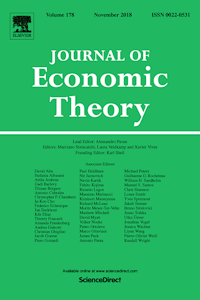
Toxvaerd, F.M.O. and Rowthorn, R.
On the Management of Population Immunity
Journal of Economic Theory
Vol. 204 (2022)
Abstract: This paper considers a susceptible-infected-recovered type model of infectious diseases, such as COVID-19 or swine flu, in which costly treatment or vaccination confers immunity on recovered individuals. Once immune, individuals indirectly protect the remaining susceptibles, who benefit from a measure of herd immunity. Treatment and vaccination directly induce such herd immunity, which builds up over time. Optimal treatment is shown to involve intervention at early stages of the epidemic, while optimal vaccination may defer intervention to intermediate stages. Thus, while treatment and vaccination have superficial similarities, their effects and desirability at different stages of the epidemic are different. Equilibrium vaccination is qualitatively similar to socially optimal vaccination, while equilibrium treatment differs in nature from socially optimal treatment. The optimal policies are compared to traditional non-economic public health interventions which rely on herd immunity thresholds.
Keywords: Economic epidemiology, externalities, herd immunity, treatment, vaccination
JEL Codes: C73, I18
Author links: Flavio Toxvaerd
Publisher's Link: https://doi.org/10.1016/j.jet.2022.105501 ![]()
Cambridge-INET Working Paper Version of Paper: On the Management of Population Immunity, Toxvaerd, F.M.O. and Rowthorn, R., (2020)
